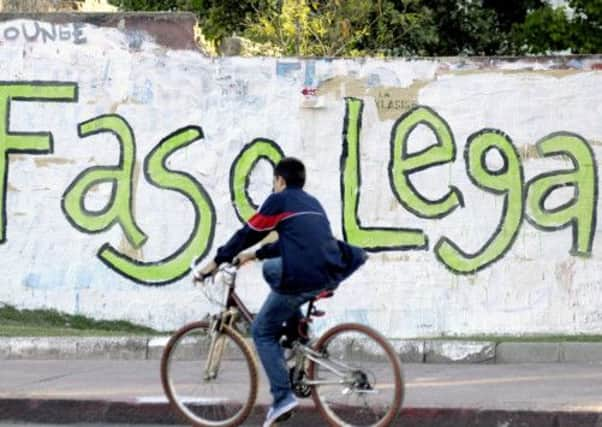Uruguay to set up state marijuana monopoly


Final Senate approval of Uruguay’s new marijuana law is expected by late September, and the government plans to license growers, sellers and users as quickly as possible thereafter to protect them from criminal drug traffickers, ruling party Senator Lucia Topolansky, who is also Uruguay’s first lady, said.
President Mujica says Uruguay’s long experience at the centre of the nation’s alcohol business makes it more than capable of dealing with the marijuana market.
Advertisement
Hide AdAdvertisement
Hide AdA state entity will license producers and control marijuana’s distribution and sale through the same local pharmacies that sell prescription medicines and toothpaste. Purchases by licensed users will be limited to 40 grams (1.4 ounces) a month. Marijuana-growing co-operatives will be encouraged, using government-approved seeds, and people registered with the state will be able to grow up to six plants at home for personal use, as long as they harvest no more than 480 grams a year.
The project was recently passed in the country’s lower House by just one vote, and while the ruling Broad Front coalition has an easier majority in the Senate, Mr Mujica has been campaigning actively for its passage, reminding Uruguayans that their government has been controlling the market for addictive substances ever since the beginning of the 20th century, when president Jose Batlle y Ordonez wanted the state to monopolise alcohol production.
“Don Jose Batlle y Ordonez had courage,” Mr Mujica said last week in one of his folksy nationwide radio talks. “The state grabbed it and made a monopoly of alcohol, because it couldn’t stop the booze, and he said “at least don’t poison the people – the booze should be good.”
Mr Batlle y Ordonez had several goals for alcohol – he wanted the whisky popular in the country to generate government revenues and guarantee a profit stream for farmers, funding the production of a national fuel so that Uruguay’s cars and lorries wouldn’t need imported petrol.
But like many other countries, Uruguay never achieved energy independence. Oil companies won an intense global campaign to focus on fossil fuels.
Mr Batlle y Ordonez died in 1929 without seeing his dreams realised, but his spirit as a statesman inspired Uruguay’s congress two years later to create Ancap, a state fuel and spirits monopoly that still refines imported oil and distills liquor at plants in Montevideo today.
Ancap’s whisky sales peaked at 332,000 litres a year in 1970, but then it began losing money. In 1996, it lost its monopoly on distilled spirits. By 2002, president Jorge Batlle decided to create a new, privately administered, Ancap subsidiary to manage the state-held company, making it nimble enough to cut costs. Now it has 60 employees and generates nearly $1 million (£640,000) a year in profits, without any state subsidies.
Ms Topolansky agrees that whisky-making is a good model for the marijuana project.
Advertisement
Hide AdAdvertisement
Hide Ad“Back then people were making wood alcohol and other very toxic blends. So the government said ‘the people are going to keep drinking, but we have to offer a quality product, that doesn’t carry dangerous side-effects.’ And the state took over production,” Ms Topolansky explained.
She said they need to do the same with marijuana, which has long been legal to use but not to sell in Uruguay – a situation she said puts people at the mercy of dangerous criminals.
“Marijuana consumers go to dealers where they sell it mixed with more addictive substances, or they sell them something else. It’s a clandestine world where we can’t enter. The state needs to regulate this market, like it did before with alcohol,” she said.
The government says its goal is to lower marijuana consumption in Uruguay by strictly regulating a legal market for it and punishing those who grow, sell or use it illegally.